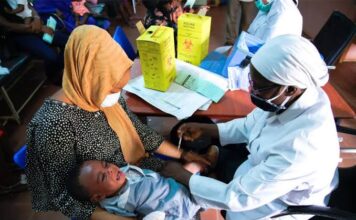The Paediatric Association of Nigeria, comprised of paediatricians, has emphasized the necessity of enhancing the rate of childhood immunisation in the nation.
They proposed that raising awareness about immunisation could involve educating secondary school students in Lagos State about the potential impact of art competitions as a means of dissemination.
The paediatricians, who hosted a creative art contest for students, clarified that the initiative was established to communicate the message of immunisation to every Nigerian.
Organized by PAN in observance of this year’s Children’s Day under the theme, “Investing in our Future means investing in our Children,” the event aimed to utilize creativity as a platform for educating children about immunisation and increasing knowledge on the subject among parents, communities, and educators.
In her welcoming speech, PAN’s President, Prof. Ekanem Ekure, highlighted concerning statistics regarding the quantity of zero-dose children in Nigeria and stressed the necessity for collective responsibility to enhance immunisation uptake in the country.
The Professor of Paediatric Cardiology at the University of Lagos College Of Medicine bemoaned Nigeria’s position, revealing that the nation accounts for 2.2 million of the 4.4 million zero-dose children in West Africa, making it home to the second-largest population of zero-dose children globally.
Zero-dose children represent those who have not received any vaccine from the routine national immunisation timetable, typically indicated by the absence of the initial Diphtheria, Tetanus, and Pertussis vaccine.
The Paediatric Cardiologist at the Lagos University Teaching Hospital expressed worry over the fact that despite immunisation saving approximately four million lives yearly on a global scale, numerous children under the age of five in Nigeria continue to perish unnecessarily from diseases that could be prevented through vaccination.
Ekure stated, “We decided to do an art competition to see how students can express themselves on the topic of immunisation using creative art.
“Sadly, the current statistics for immunisation coverage nationally for the age of about 14 weeks, that is the vaccine that should have been received at the 14th week of age is just about 57 per cent generally for Nigeria.
“But if you know, say a child who has received all the vaccines that are in the National Immunisation Schedule, we are down to 23 per cent and that is low for our country. That is what we mean by zero dose children.”
A specialist from the West African College of Physicians stated that the low rate of childhood vaccinations in Nigeria is contributing to the high number of deaths among children under the age of five.
He noted, “It is, therefore, not surprising that we have a very high under-five mortality rate. We have the largest number of under-five children dying in the world and, sadly, these children are dying from diseases that can be prevented. The government has made available vaccines free to be taken by children.
“West Africa has a population of 4.4 million zero-dose children and Nigeria has half of the 4.4 million. Very sad! The top areas where those zero children tend to be more located are urban slums, remote and hard-to-reach places in Nigeria.
“So, a lot has to be done to reach children in those places to ensure they receive these immunisations. Four million lives are saved annually globally from having immunization.”
Vaccines can prevent many deadly childhood diseases, such as flu, malaria, pneumonia, diarrhea, tuberculosis, polio, diphtheria, whooping cough, and measles.
To improve vaccination rates in Nigeria, a pediatrician emphasizes that immunization must become a collective responsibility, involving the government, healthcare workers, parents, communities, traditional leaders, and religious leaders, all working together to increase vaccine uptake and protect children’s lives.
The PAN president stated, “The government’s role is of course to make the vaccines available, ensure the cold chain is sustained and there is no stock out. And to also ensure health workers are available to provide the vaccines when needed.
“The health workers have a responsibility to make sure that these children are taken where they should receive the vaccination.
“Also, the community — the traditional and religious leaders all have roles to play in this. We need traditional and religious leaders to lend their voices to this cause so that the lives of our children will be saved.
“Then professional associations like PAN can advocate to the government, caregivers, and all the stakeholders.”
Ekure called on the media to correct misconceptions and misinformation about immunization. Professor Folasade Ogunsola, Vice Chancellor of the University of Lagos, emphasized the importance of nurturing children to become responsible leaders.
She encouraged the children to grow up to be responsible adults. Dr. Iretiola Fajuolu, a pediatrician and associate professor, presented ‘Facts in Immunization’, highlighting immunization as a precious gift from God and a powerful tool to prevent infectious diseases, emphasizing its significance in protecting children’s health.
“It is our corporate social responsibility and it is a way of getting ourselves protected from harmful disease. Immunisation is a very viable tool to prevent infectious diseases. Vaccines have been made available for over thirty diseases, which are infectious diseases and what vaccines do.”
The neonatologist identified ignorance as one of the major drivers of low childhood immunisation uptake in the country.
“Our indexes are still very low. Ignorance is one major reason why our people do not go for vaccinations. So we need all hands on deck to educate people. We need the media to educate Nigerians on the importance of immunisation”, the paediatrician mentioned.
The highlight of the event was the announcement and presentation of awards to the winners of the children’s art contest. Ugochukwu Anthony, a student from National College Gbagada, took first place and received a prize of N150,000.
Akinsanya Ibukuoluwa from Igbobi College, Yaba, came in second and received N100,000, while Olawale Owonikoko took third place and received N50,000.
The competition, organized by PNA, saw participation from over 20 public and private secondary schools in Lagos.
